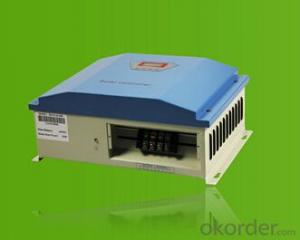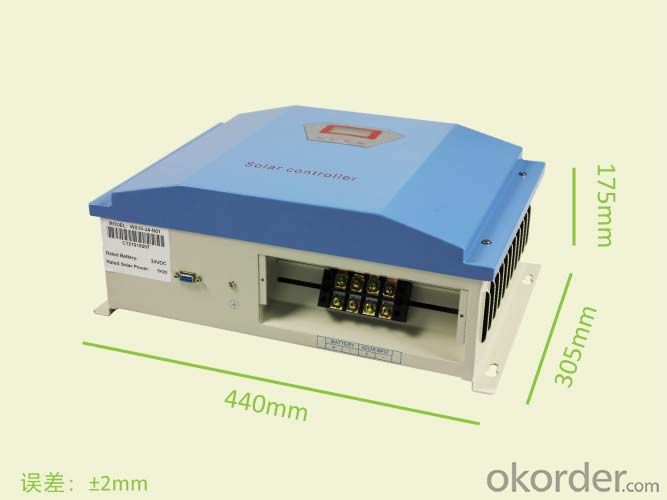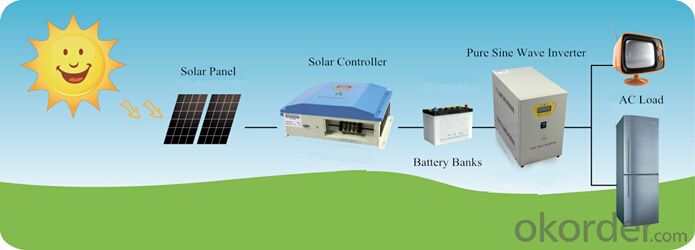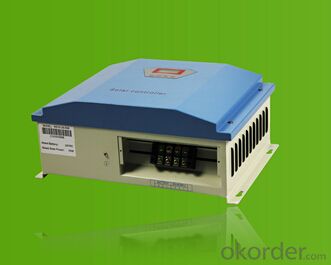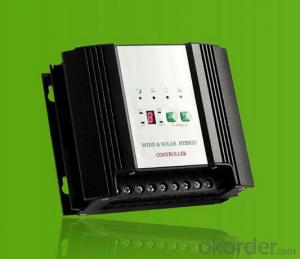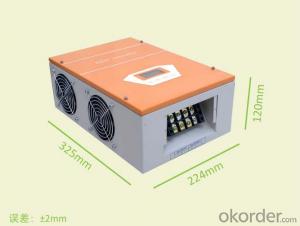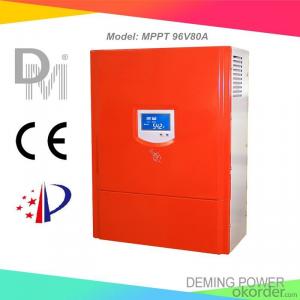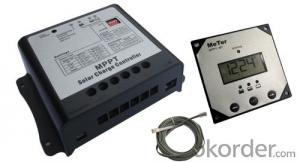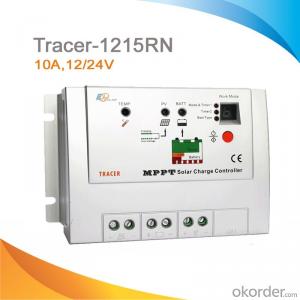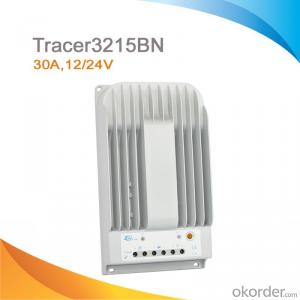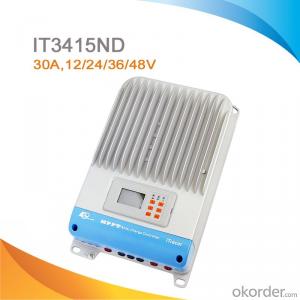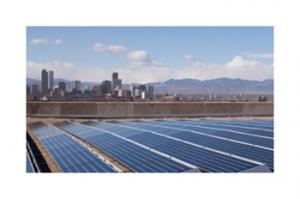Solar Power Controllers - 10kW MPPT Solar Charge Controller with Charging Function
- Loading Port:
- Shanghai
- Payment Terms:
- TT or LC
- Min Order Qty:
- 1 unit
- Supply Capability:
- 10000 unit/month
OKorder Service Pledge
OKorder Financial Service
You Might Also Like
I. PRODUCT INTRODUCTION
Solar controller is control device which can control solar panel and transform solar energy into electricity then store to the battery bank. Solar controller is the most important part in off-grid system, whose performance has much effect on life expectancy and operation of the whole system, especially the battery expectancy. Or battery service life will be shortened by over charge or over discharge.
II. PERFORMANCE FEATURES
Superior military-grade components to ensure the product stability.
Perfect protection function, thus the system has higher reliability.
Check and set all operation parameters as requirement from LCD display.
III. APPLICATION AREAS
Standalone Domestic household photovoltaic power system
Mobil communication base stations, expressway and other non-residential regions.
Coastal islands, remote mountainous, border posts for regions shortage of or without electricity.
Government demonstration projects, landscape lighting project etc.
IV. 10KW TECHNICAL PARAMETERS
Product Model | WS100-120-N00 | WS100-220-N00 | WS100-240-N00 |
Rated battery power | 120V | 220V | 240V |
Rated solar input power | 10kW | 10kW | 10kW |
Floating charge voltage | 145V | 266V | 290V |
Max Open Circuit Voltage | 250V | 458V | 500V |
Dimensions (L x W x H) | 442×307×172 mm | ||
Net Weight | 8kg | ||
Display mode | LCD | ||
Cooling | Fan | ||
Protection Level | IP20(Indoor) | ||
Quiescent current | ≤20 mA | ||
Protection functions | Battery over charge; battery anti-reverse-connection; solar reverse charge protection; solar anti-reverse-connection; lightning protection. | ||
Ambient temperature | -20~+55℃ | ||
Ambient humidity | 0~93%,without condensing | ||
Working altitude | ≤4000m | ||
In order to serve our customers better, our company can adjust parameter configuration according to customer’s requirement. | |||
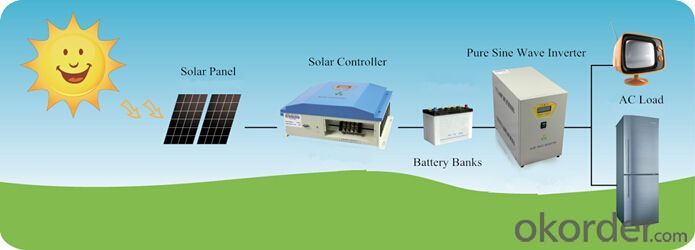
- Q: Is a solar controller necessary for grid-tied solar systems?
- Yes, a solar controller is necessary for grid-tied solar systems. A solar controller regulates the flow of electricity from the solar panels to the grid, ensuring that the system operates efficiently and safely. It helps monitor and optimize the power output, protect against overcharging or overloading, and allows for easy integration with the grid.
- Q: What is the maximum power handling capacity of a solar controller?
- The maximum power handling capacity of a solar controller varies depending on the specific model and brand. However, high-quality solar controllers typically have a maximum power handling capacity of around 60 to 100 amps, allowing them to handle up to several thousand watts of solar power.
- Q: Can a solar controller be used with a solar-powered mining operation?
- Yes, a solar controller can be used with a solar-powered mining operation. A solar controller regulates the flow of electricity from the solar panels to the mining equipment, ensuring that the power generated is efficiently utilized and preventing damage to the equipment. It also helps in monitoring and managing the charging and discharging of batteries used in the mining operation. Overall, a solar controller is essential in optimizing the performance and reliability of a solar-powered mining operation.
- Q: What is the maximum wire size that can be connected to a solar controller?
- The maximum wire size that can be connected to a solar controller depends on the specific solar controller model and its specifications. It is important to consult the manufacturer's documentation or user manual to determine the maximum wire size that can be used with a particular solar controller.
- Q: How do solar controllers help in maximizing energy harvest?
- Efficient management and regulation of electrical energy flow is essential for maximizing the energy harvest from solar panels. This is where solar controllers come in. They are designed to monitor and control the charging process of batteries connected to solar panels. A primary function of solar controllers is to prevent overcharging of batteries, which can result in reduced battery capacity and lifespan. By constantly monitoring the battery voltage and current, solar controllers ensure that the batteries are charged optimally, avoiding any damage caused by overcharging. This is particularly important in areas with high solar radiation, where the risk of overcharging is higher. Solar controllers also contribute to maximizing energy harvest through the implementation of maximum power point tracking (MPPT). This technology allows the solar controller to continuously adjust the voltage and current from the solar panels to the levels that produce the maximum power output. By dynamically tracking the maximum power point, solar controllers ensure that the solar panels operate at their most efficient state, even when faced with varying weather conditions or changes in solar intensity. Furthermore, solar controllers often include additional features such as load control and time-based control. Load control enables the solar controller to regulate the power supplied to loads connected to the system, preventing excessive consumption or discharge of the batteries. Time-based control allows users to program specific time intervals for the solar panels to charge the batteries, ensuring that energy harvest is maximized during periods of peak sunlight. In conclusion, solar controllers are crucial for maximizing energy harvest by preventing battery overcharging, implementing MPPT technology for optimal power output, and offering additional features for load and time-based control. These devices play a vital role in ensuring the efficient and effective utilization of solar energy, ultimately leading to increased energy harvest and improved system performance.
- Q: Can a solar controller be used with a solar-powered greenhouse ventilation system?
- Yes, a solar controller can be used with a solar-powered greenhouse ventilation system. The solar controller helps regulate and control the flow of electricity from the solar panels to power the ventilation system. It ensures that the system operates efficiently and optimizes the use of solar energy.
- Q: What is the role of a solar controller in preventing overcurrent in the solar panel system?
- Maintaining the safety and optimal functioning of a solar panel system heavily relies on the crucial role of a solar controller in preventing overcurrent. Also referred to as a charge controller, this device effectively regulates the flow of current from the solar panels to the battery bank or electrical load. A significant function of the solar controller is to prevent the batteries from overcharging. As solar panels generate electricity from sunlight, it is possible for them to produce more current than the battery bank can handle if not properly regulated. This surplus of current can result in overcharging, which has the potential to damage the batteries and reduce their lifespan. To prevent the occurrence of overcurrent, the solar controller actively monitors the voltage of the battery bank and makes necessary adjustments to the charging current. When the batteries reach their maximum voltage level, the solar controller either reduces the charging current or completely disconnects the solar panels from the battery bank to halt any further flow of current. This measure ensures that a safe and optimal charging level is maintained for the batteries, ultimately guaranteeing their longevity and performance. Furthermore, the solar controller also plays a vital role in safeguarding the solar panels themselves from overcurrent. In cases where partial shading occurs, a phenomenon known as "hot spots" can emerge, wherein certain sections of the solar panels receive less sunlight compared to others. This imbalance in the current flow can lead to overcurrent in those specific areas, potentially causing damage to the solar panels. To mitigate these issues, solar controllers are equipped with various protective features, including overcurrent protection, short-circuit protection, and reverse polarity protection. By constantly monitoring the current flow from the panels, the solar controller promptly disconnects them if any abnormalities are detected, effectively preventing any potential damage. In summary, the primary function of a solar controller in a solar panel system is to regulate the charging current to the battery bank, thus preventing overcharging and damage to the batteries. Additionally, it serves to protect the solar panels from overcurrent and potential damage caused by shading or other irregularities. This ensures the system's longevity, safety, and optimal performance.
- Q: How do I protect a solar controller from overheating?
- To protect a solar controller from overheating, there are several steps you can take: 1. Proper installation: Ensure that the solar controller is mounted in a well-ventilated area, away from direct sunlight and other sources of heat. This will help to prevent excessive heat buildup. 2. Adequate sizing: Make sure the solar controller is properly sized for your solar panel system. Undersized controllers may struggle to handle the load, leading to overheating. Consult the manufacturer's specifications or seek professional advice to ensure the controller is suitable for your system. 3. Check ambient temperature: Monitor the ambient temperature around the solar controller regularly. If the temperature rises above the recommended operating range, consider relocating the controller to a cooler area or installing additional ventilation. 4. Use heat sinks: Consider using heat sinks or heat dissipation devices, especially if the solar controller is located in a confined or enclosed space. Heat sinks help to absorb and dissipate excess heat, preventing it from building up and damaging the controller. 5. Install thermal sensors: Many advanced solar controllers come equipped with built-in thermal sensors that can detect excessive heat and automatically shut down or reduce the load on the controller. If your controller does not have this feature, you can consider installing external thermal sensors to monitor and trigger protective measures when necessary. 6. Ensure proper wiring: Faulty or loose wiring can increase resistance and cause the solar controller to overheat. Regularly inspect the wiring connections and ensure they are secure, tight, and properly insulated. If you notice any signs of damage or overheating, address the issue immediately. 7. Regular maintenance: Regularly clean and inspect the solar controller for any debris, dust, or dirt accumulation, as these can impede proper heat dissipation. Use a soft brush or compressed air to clean the controller gently. By following these steps, you can help protect your solar controller from overheating and ensure its optimal performance and longevity.
- Q: Can a solar controller be used in harsh weather conditions?
- Yes, a solar controller can be used in harsh weather conditions. Solar controllers are designed to withstand various weather conditions including extreme temperatures, high humidity, rain, and snow. They are built with durable materials and protective features to ensure their functionality and longevity even in harsh environments.
- Q: Can a solar controller be used with both 12V and 24V batteries?
- Yes, a solar controller can be used with both 12V and 24V batteries. Most modern solar controllers are designed to be compatible with various battery voltage systems, allowing users to connect both 12V and 24V batteries to the controller without any issues. However, it is important to ensure that the controller is capable of handling the higher voltage if using a 24V battery system.
Send your message to us
Solar Power Controllers - 10kW MPPT Solar Charge Controller with Charging Function
- Loading Port:
- Shanghai
- Payment Terms:
- TT or LC
- Min Order Qty:
- 1 unit
- Supply Capability:
- 10000 unit/month
OKorder Service Pledge
OKorder Financial Service
Similar products
Hot products
Hot Searches
Related keywords


